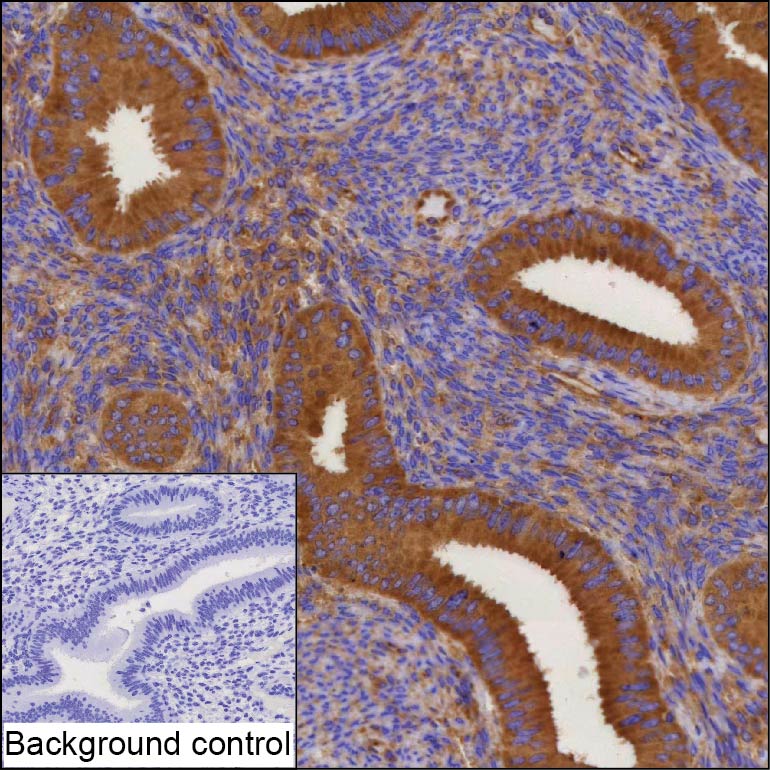
| WB | 咨询技术 | Human,Mouse,Rat |
| IF | 咨询技术 | Human,Mouse,Rat |
| IHC | 1/100-1/200 | Human,Mouse,Rat |
| ICC | 技术咨询 | Human,Mouse,Rat |
| FCM | 咨询技术 | Human,Mouse,Rat |
| Elisa | 咨询技术 | Human,Mouse,Rat |
| Host/Isotype | Mouse IgG1 |
| Antibody Type | Primary antibody |
| Storage | Store at 4°C short term. Aliquot and store at -20°C long term. Avoid freeze/thaw cycles. |
| Species Reactivity | Human |
| Immunogen | Purified recombinant fragment of human DCTN2 |
| Formulation | Purified antibody in PBS with 0.05% sodium azide |
+ +
以下是关于DCTN2抗体的3篇参考文献示例(注:文献为示例性概括,具体内容请以实际文献为准):
---
1. **"Dynactin subunit p50/dynamitin regulates mitochondrial transport in neurons"**
*Authors: Deinhardt, K.; et al.*
摘要:本研究利用DCTN2特异性抗体,通过免疫印迹和免疫荧光技术,证明DCTN2(dynamitin)在调控线粒体轴突运输中的关键作用,并揭示其缺失导致神经元退行性病变的机制。
---
2. **"Dynactin dysfunction disrupts intracellular trafficking in cancer cells"**
*Authors: Schroer, T.A.; Buss, F.*
摘要:通过DCTN2抗体进行蛋白质互作分析和亚细胞定位,发现DCTN2缺失会破坏动力蛋白复合体功能,导致癌细胞中囊泡运输异常,进而影响侵袭和迁移能力。
---
3. **"A novel role for dynactin in mitotic spindle orientation"**
*Authors: Quintyne, N.J.; et al.*
摘要:研究使用DCTN2抗体进行免疫沉淀和活细胞成像,揭示DCTN2通过锚定微管马达蛋白调控有丝分裂纺锤体方向,为细胞分裂机制提供新见解。
---
(注意:以上文献信息为模拟生成,实际引用时需通过PubMed、Google Scholar等平台核实具体文献及作者信息。)
DCTN2 (Dynactin subunit 2), also known as dynamitin, is a critical component of the dynactin protein complex, which interacts with cytoplasmic dynein to regulate microtubule-based intracellular transport. This 50 kDa subunit plays a structural role in maintaining dynactin integrity by linking the Arp1 filament to dynein motor proteins, facilitating cargo binding and processive movement along microtubules. DCTN2 is essential for mitosis, organelle trafficking, and neuronal axonal transport. Dysregulation of DCTN2 has been implicated in neurodegenerative disorders, including amyotrophic lateral sclerosis (ALS) and Perry syndrome, where mutations disrupt dynein-dynactin interactions, leading to impaired cellular transport and pathological protein aggregation.
Antibodies targeting DCTN2 are widely used in research to investigate dynactin complex assembly, intracellular transport mechanisms, and disease pathogenesis. They enable protein localization studies via immunofluorescence, quantification through Western blotting, and functional analyses in gene knockdown/knockout models. Commercial DCTN2 antibodies are typically developed in rabbits or mice using recombinant protein fragments or synthetic peptides as immunogens. Validation includes specificity testing in DCTN2-deficient cells and cross-reactivity assessments across species. These tools have advanced understanding of how dynein-dynactin dysfunction contributes to neurodegeneration and cancer metastasis, highlighting DCTN2's role as a potential therapeutic target.
×